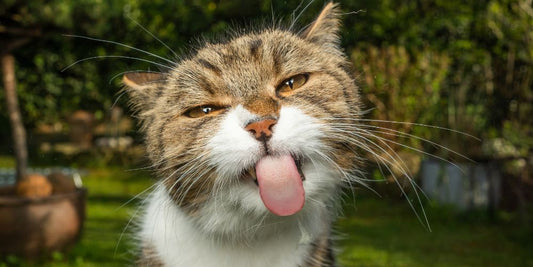Heartworm can be a significant cause of disease in dogs and less commonly in cats. The transmission of heartworm differs to intestinal worms, as our pets are infected with heartworm after being bitten by a mosquito carrying heartworm larvae. This means that even pets who spend a lot of time indoors, or do not necessarily even meet other animals, can still be infected. In Australia, it is recommended to use heartworm prevention products all year round as it is impossible to reliably predict when the “mosquito season” might start and finish.
Heartworm in Cats
Heartworm disease in cats is different from heartworm disease in dogs. If a cat is infected with larvae from a mosquito bite, their immune response towards the larvae usually results in the larvae being killed and not developing into adult heartworm. The symptoms seen in an infected cat result from the immune response against the larvae in the lungs and can included asthma like breathing, coughing and vomiting. Diagnosis can be more involved than the simple blood test used in dogs, and may require chest x-rays or ultrasound of the heart. Treatment of heartworm disease in cats poses many challenges and risks, therefore monthly prevention if the best method to avoid heartworm infection in your cat.
Where is heartworm in Australia?
Heartworm is most often found in areas with a warm climate and large mosquito numbers. It is often found in tropical and subtropical areas of Australia, however in recent decades heartworm has become increasingly prevalent in the more southern states as well. Studies of wild fox populations have been conducted and found that around 7-9% of foxes in the Melbourne and Sydney surrounds carry heartworm, acting as a possible source of infection for domestic dogs and cats.
How do pet become infected with heartworm?
When a mosquito bites an animal that has heartworm, they ingest the pet’s blood, and can also ingest microscopic heartworm larvae known as microfilariae which are circulating in the blood. These microfilariae then develop further inside the mosquito and then migrate to the mouth parts of the mosquito, where they can be deposited into another pet at another feed/bite by the infected mosquito. This larval stage of the heartworm migrates through the animal's tissues and over a period of around 6 months, they develop into a mature adult (up to 20-30cm long) which lives in the heart chambers and major blood vessels of the infected pet. The adult worms mate, and the female produces millions of microfilariae to circulate in the peripheral blood to renew the lifecycle.
Symptoms of heartworm disease
Infection can occur at any age, but it is rarely diagnosed in a dog less than 1 year of age because the larvae take up to 7 months to mature following initial infection by mosquito bite.
The worms predominantly affect the lungs and heart, which is why a mild persistent cough, exercise intolerance and tiredness are often the early signs. Later in the disease, pets can develop heart failure which can cause severe coughing, increased thirst, fluid in the abdomen, difficulty breathing, collapse or even sudden death.
Vets are able to diagnose heartworm disease using an appropriate combination of physical examination, blood tests, x-rays and ultrasound. If a dog is confirmed to have heartworm, medical treatment is required. In severely affected patients, there is a greater risk of complications associated with treatment. Rarely surgery may be required to remove adult worms.
Preventing heartworm disease.
Prevention is much better than the cure and infection with heartworm is quite simple to prevent.
Heartworm preventatives are effective and low cost, when compared to treatment and diagnosis. Dogs should start heartworm prevention from three months of age, or in some cases earlier.
Many vets now also recommend using heartworm prevention in cats living in high risk area, despite their lower likelihood of serious disease from heartworms. The medication used to treat heartworm infections in dogs cannot be used in cats, so prevention is the only means of protecting cats from the effects of heartworm disease.
Note that “All wormers” often refer to treatment of intestinal worms only, and many products sold for treatment of intestinal worms do not prevent heartworm.
Pet Lovers Club delivers complete personalised parasite protection directly to your door every month, making the product choice easy, ensuring you never forget and most importantly optimising the health and lifespan of your much loved pets.

By Dr Lydia Matheson BVSc
Pet Lovers Club Vet






